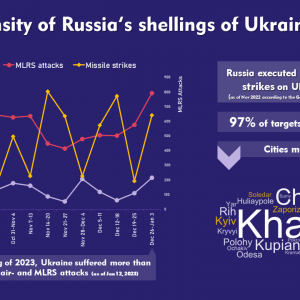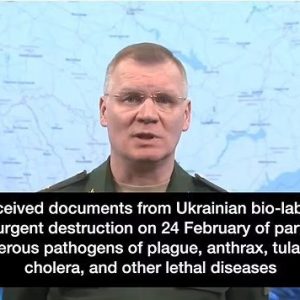
The Russian establishment has been justifying its war against Ukraine by different considerations ranging from threats to national security and preventing a potential attack on Russian territories to the “denazification” of Ukraine. However, the horrors of the war Russia wages against its neighbor provide an opportunity to analyze and reevaluate the interpretation of the Russian policy that it has been developing and persistently implementing over the past two decades. A profound understanding of the underlying motives of such a position in the Russian leadership is crucial when devising a further course of action toward Russia.
- Pursuit of status
In the world order, which was established in the early 1990-s, the Russian Federation was not the superpower its predecessor, the USSR, used to be. With many former Soviet Republics gaining their independence, Russia lost its territories as well as economic and political influence. The search for a new raison d’etre combined with an embedded in the Russian population’s minds memory of the recent influence and power of their state had resulted in revisionist ideas regarding the current configuration of the international relations system.
It was clear that the USA did not perceive Russia as an equal opponent, and there were not too many spheres in which the latter was able to counter that. One of such spheres was security and strategic stability, which became one of the cross-cutting themes of Russian-American relations. Noticing that the security-related topics were fruitful in terms of getting closer to a global power status and not being able to attain considerable results in other fields, Russia started securitizing its foreign policy, or in other words, considered most issues occurring around as security-related, even if they were not. This paradigm has been evident in the rhetorics of Russian officials concerning such topics as energy, economy, and politics.
Therefore, from this perspective, recent Russian policy towards Ukraine and the western powers (i.e., its building of the Nord Stream-2 pipeline to manipulate the European states; gathering troops by the Ukrainian border and using them as a pressure factor; sending ultimatums to the western powers regarding restructuring the European security system; as well as invading Ukraine after the negotiations failed) was aimed at reaching the status of a global decision-maker speaking as equals with major powers.
- Protecting the sphere of influence
In continuation of the above-mentioned considerations, Russians believe that their state has a sphere of influence, which is supposed to be inviolable by other actors. Naturally, this “zone of exclusive interest” encompasses former Soviet republics and socialist bloc members. This explains why Putin called the collapse of the Soviet Union the greatest geopolitical catastrophe of the twentieth century, as it paved the way for Russia’s former allies to drift away from it and resulted in some of them joining the NATO and the European Union.
With this in mind, any signs of pro-Western policy implying the loss of Russian political influence are perceived as a threat to the national interests and are taken particularly painfully by the Kremlin. This was evident during public uprisings in Belarus and Kazakhstan, where Russia actively supported the pro-Russian governments; in 2008, when it invaded Georgia after the latter expressed its intention to join the NATO; and in 2014 in Ukraine, when the Revolution of Dignity resulted in overthrowing the pro-Russian president Yanukovich, and Russia occupied Crimea and incited the war in the Donbas region of Ukraine. The renewed ongoing hostilities are a natural continuation of this line of Russian policy aimed at violating human rights and limiting the sovereignty of independent states, which it considers to be within its sphere of influence.
- Searching for an external enemy to conceal internal issues
Despite Russia being the largest country in the globe, rich with natural resources, most of its population lives quite poorly. Since the Kremlin is very concerned about its remaining in power, it has to create visibility of democratic processes in the state and ensure public support. To draw the attention away from the problems ordinary Russians face in their everyday lives, a wide scope of myths is created and spread via the propaganda machine envisaging foreign enemies doing their utmost to ruin the state. Quite naturally, such narratives mostly focus on the western powers and NATO, which are viewed as hostile actors guilty of all Russian misfortunes.
Even despite the complete groundlessness of such accusations towards the West and numerous human rights and national laws violations committed by Putin and all of the Russian establishment, the latter are viewed as messiahs and saviors of the nation. Hence the rising public support for the Russian president after the 2014 occupation of Crimea and the launching of the unprovoked full-scale war against Ukraine one and a half months ago.
- Russian hatred toward Ukraine
In the light of the previous points, the geopolitical, economic, and symbolical value of Ukraine was of particular importance to the Russian elites. Consequently, the Kremlin did everything it could to prevent the Ukrainians from distancing themselves from Russia. However, most Russian struggles to create a positive image of their country among the Ukrainian population, primarily including but not limited to the generous funding for pro-Russian presidential candidates, political parties, and TV channels, have led to the opposite effect.
The opposition of the Ukrainian people to numerous attempts of oppression and their will to follow the path westward, to democracy and freedom, facilitated a specific sort of contempt for Ukrainians among the Russian establishment, which was widely caught up and supported by the population, and every Ukraine’s step forward on the way to its success is perceived as hostile to Russia. The full-scale invasion has been yet another opportunity for the Russians to demonstrate that they will not stop until the independent Ukrainian state ceases to exist.
Given the above-mentioned, Russia’s aggressive foreign policy, which it has been translating into life over the past years, has been widely misinterpreted and underestimated. However, the open aggression against a democratic state almost in the center of Europe helps the civilized world realize the true essence of the Russian policy and understand that deterring or appeasing an aggressor of such a scale is not an alternative to stopping it by a unified and powerful response.


